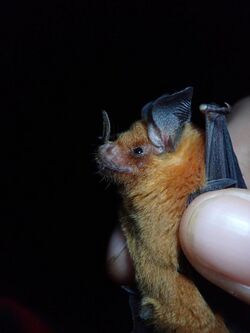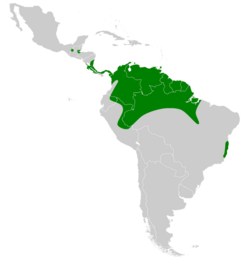Biology:Niceforo's big-eared bat
| Niceforo's big-eared bat | |
|---|---|

| |
| Scientific classification | |
| Kingdom: | Animalia |
| Phylum: | Chordata |
| Class: | Mammalia |
| Order: | Chiroptera |
| Family: | Phyllostomidae |
| Genus: | Trinycteris Sanborn, 1949 |
| Species: | T. nicefori
|
| Binomial name | |
| Trinycteris nicefori Sanborn, 1949
| |

| |
Niceforo's big-eared bat (Trinycteris nicefori) is a bat species from South and Central America, ranging from Chiapas to Bolivia and northeastern Brazil.[1] Its habitat is primary and secondary forest at altitudes from sea level to 1000 m.[1] It is crepuscular, being most active in the hour after sunset and before dawn.[1] The species is monotypic within its genus.[2]
Description
It is a small species with triangular ears. Individuals weigh 7–11 g (0.25–0.39 oz) and have forearm lengths of 35–40 mm (1.4–1.6 in). Its fur is grayish-brown. Most individuals have a faint, pale-colored stripe that runs down their back along the spine. Its dental formula is 2.1.2.32.1.3.3 for a total of 34 teeth.[3]
Biology and ecology
It is nocturnal, roosting in sheltered places during the day such as hollow logs and human structures.[3]
Range and habitat
It is found in Belize, Bolivia, Brazil , Colombia Costa Rica, Ecuador, French Guiana, Guatemala, Guyana, Mexico, Nicaragua, Panama, Peru, Suriname, Trinidad and Tobago, and Venezuela. It is found at elevations up to 1,000 m (3,300 ft) above sea level.[1]
Conservation
As of 2015, it is classified as a least-concern species by the IUCN.[1]
References
- ↑ 1.0 1.1 1.2 1.3 1.4 1.5 Tavares, V.; Burneo, S. (2015). "Trinycteris nicefori". IUCN Red List of Threatened Species 2015: e.T13381A22123365. doi:10.2305/IUCN.UK.2015-4.RLTS.T13381A22123365.en. https://www.iucnredlist.org/species/13381/22123365. Retrieved 19 November 2021.
- ↑ Simmons, N.B. (2005). "Order Chiroptera". in Wilson, D.E.; Reeder, D.M. Mammal Species of the World: A Taxonomic and Geographic Reference (3rd ed.). Johns Hopkins University Press. p. 411. ISBN 978-0-8018-8221-0. OCLC 62265494. http://www.departments.bucknell.edu/biology/resources/msw3/browse.asp?id=13801291.
- ↑ 3.0 3.1 Escobedo, L.; León-Paniagua, Livia (2014). Ceballos. ed. Mammals of Mexico. JHU Press. pp. 687. ISBN 978-1421408439.
Wikidata ☰ Q209207 entry
 |

